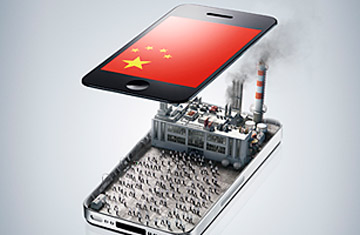
(6 of 7)
Foxconn, a Taiwanese-owned partsmaker, employs about 1 million people in China. In 2010 it transformed a swathe of fallow land and a complex of empty buildings in Chengdu into its iPad-manufacturing nerve center. Some parts of the $2 billion Foxconn compound were constructed in just a few months. In May 2011, four workers were killed when a buildup of aluminum dust exploded in a poorly ventilated room. "How can you build something in such a short time and not expect there to be problems?" asks SACOM's Chan. (The independent audit of Apple earlier this year by the Fair Labor Association found that about 54% of the 16,648 or so workers in Chengdu that it surveyed had witnessed or been involved in an accident.) Foxconn says the criticism is not totally fair. "It's understandable why Foxconn is a ready-made target," says Louis Woo, a special assistant to Foxconn CEO Terry Gou. "Since we are the largest consumer-electronics maker in the world and probably the largest private employer in China, this position carries a certain social responsibility. Foxconn is not perfect--there is no such thing as a perfect factory--but we aspire to be a better company every day."
The sad truth is that Foxconn's plants are a better work environment than many other Chinese factories. Some of the workers I spoke with said they took a job at the company's Chengdu base because it beat working in a small sweatshop with fly-by-night owners. The tales that formed the crux of American dramatist Mike Daisey's discredited monologue--meeting a 14-year-old Foxconn employee, watching an assembly-line worker with a maimed hand caress an iPad--turned out to be figments of his imagination, although media exposs in recent months have documented labor abuses at Foxconn. None of the workers I spoke to were shy in their criticisms of their workplace. There were complaints about Foxconn's reliance on interns, some of whom were ordered by their vocational institutes into factory work even though they were studying unrelated majors like tourism. Long hours and boredom were the most common grievances. This is, after all, a factory job. Others said salary deductions cut into their take-home pay far more than they had expected. A few complained about acrid chemical smells that triggered headaches, as well as failing eyesight and cramped muscles from standing for hours at a time.
Yet Foxconn keeps signing on new workers, even though many other companies complain of labor shortages as Chinese youth increasingly eschew factory work. (Apple runs educational programs for workers in supplier factories.) Earlier this year, Foxconn announced that it would be adding 100,000 laborers to its payroll in Zhengzhou, where Cook visited in March. Starting salaries of $260 a month were advertised. The line of job seekers reached half a mile. Even after all the criticism of Foxconn--the suicides, the industrial accidents, the punishing hours--young Chinese still want a job making Apple devices. "Our challenge is that we have to turn away good workers," says Foxconn's Woo.
